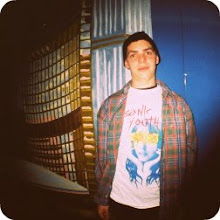 Wounded Lion blends an array of often repetitive, simplistic rhythms that, when presented as a complete package, display something much more complex. Their guitar driven sound can get as jangly as Pavement's older material or as noisy as a Modest Mouse b-side. The lyrics are often humorous and charming, and tackle such subject matter as living in primitive and uncomfortable places, ("Creatures in the Creatures") and singer Brad Eberhard has a similar pitch to the late Wesley Willis - albeit not so tone-deaf.
Wounded Lion blends an array of often repetitive, simplistic rhythms that, when presented as a complete package, display something much more complex. Their guitar driven sound can get as jangly as Pavement's older material or as noisy as a Modest Mouse b-side. The lyrics are often humorous and charming, and tackle such subject matter as living in primitive and uncomfortable places, ("Creatures in the Creatures") and singer Brad Eberhard has a similar pitch to the late Wesley Willis - albeit not so tone-deaf. The dichotomy of rhythmic thud and pop sensibility are WL's shtick and battle simultaneously for the length of the album. The album begins with the strongest track, "Hungry?", is a force of repetition and built from almost childlike lyrics ("I think it's hungry/ yeah, I think it's hungry"), which, when standing alone, hold nothing, but together create an impressive pop song. This formula repeats itself 12 times through the course of the record and for listeners, you either get it or you don't. "Degoba System" is simply about Yoda's hideout planet from The Empire Strikes Back, while "Pony People" either examines a new breed of humans or the variety of phony people we meet in life. The later half of the album picks it up a notch however, at this point, the songs begin to get a bit goofy - immature almost. "Block Socks" is more about the music than having something important to say, while "Silver People" is about Coors Light enthusiasts.
Whether raw or mystical, having something to say with a song is trumped by the feeling a song can produce. Although Wounded Lion's songs can be about astrology ("Belt of Orion") or geography ("Hunan Province"), they're simply just titles - these songs are chunky party tunes - they're goofy and fun and meant to be taken at face value.
Published by Treble Magazine




